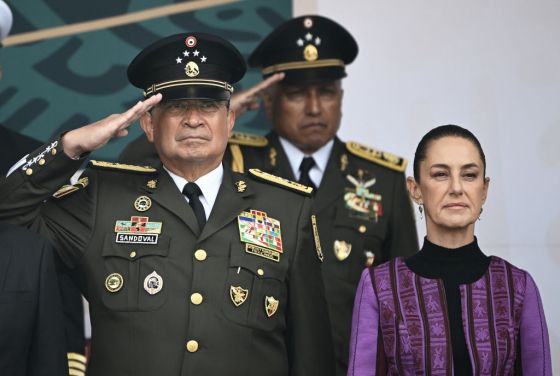If you want to watch an opportunity slipping away—look south.
On October 1, Claudia Sheinbaum will succeed Andrés Manuel López Obrador as president of Mexico—one illiberal left-wing populist taking over the reins of power from another illiberal left-wing populist. Sheinbaum is an avowed enemy of the reforms and liberalization begun at the turn of the century by former President Ernesto Zedillo, who recently warned that Mexico is sliding into “tyranny.”
For most of the 20th century, Mexico was a single-party authoritarian state, without real elections or real political competition. Until a few decades ago, the president, every member of the Senate, and every state governor belonged to the same party—the Institutional Revolutionary Party—which also controlled the economy and managed elections. Mario Vargas Llosa famously described Mexico in those years as la dictadura perfecta—“the perfect dictatorship.” Sheinbaum wants to recapture some of that dictatorial perfection, reasserting state control over the economy, putting the judiciary under political control, expanding the domestic role of the military, etc. Asked by the Financial Times about such niceties as constitutional checks and balances, Sheinbaum played the good populist: “The people should decide,” she declared.
Ah, yes, the people: those inconvenient hunks of meat in whose name every rapacious and self-aggrandizing autocrat who has ever walked this good green Earth purports to rule.
I like Mexico and have spent a fair bit of time there. One of the most useful services the country provides is reminding Americans to be grateful for Canada. And I am not joking about that: Canada is a prosperous, decently governed, largely quiet country, famously polite and deferential, a fact that sometimes obscures how tough the Canadians are and what important allies they have been. As a share of its population, Canada’s casualties in World War I were nearly 10 times those of the United States.
But Canada is a great neighbor to have in peacetime, too, with a GDP per capita nearly 30 percent higher than the average in the European Union as the International Monetary Fund runs the numbers, a richer country than Germany or the United Kingdom, and a significantly richer country than France or Japan. And that isn’t merely a statistical quirk associated with having a relatively small population: Canada’s GDP/capita is higher than that of the United Arab Emirates, Hong Kong, or Israel. Canada—not China—is the largest trading partner for the United States.
Do you know what would make the United States radically better off: Another Canada, one to the south, where there’s sunshine and beaches and relative proximity to vital U.S. interests in Central and South America.
But Mexico is not going to be that prosperous, happy, decent country. Not without a lot of U.S. help and, to put it bluntly, U.S. interference—which Sheinbaum et al. do not want.
Mexico has done well economically in the past four decades or so. Mexico’s real GDP/capita today is nearly four times what it was in 1980. Trade has been good for Mexico. U.S. investment—and other foreign investment—has been good for Mexico. But the lesson from Mexico is the same as the lesson from China: Prosperity is not enough. Economic liberalization is a necessary condition for thriving, but it is not sufficient. Unlike China, Mexico has undergone meaningful internal political reforms that have paid real dividends, but it has not been enough.
The American political conversation treats Mexico almost exclusively as an economic competitor that inconveniently thrives in areas that put it into competition with politically sensitive U.S. interests (such as automobile manufacturing) and as a source of immigrants who are, if I may be forgiven for putting it plainly, mostly unwanted—the consensus there is much more bipartisan than many of our progressive friends seem to think.
But there is more to Mexico than the Nissan Sentra (headquarters in Yokohama, factory in Aguascalientes) and the border. And chaotic and problematic as the border is—and that is a longstanding failure for a string of American presidents, most definitely including Donald Trump—that chaos doesn’t begin at the Rio Grande. We don’t have a lot of Canadian economic refugees looking for work in Home Depot parking lots, and a Mexico that was more prosperous, more stable, more decent, more liberal, more integrated into North America, etc., would offer less difficulty at the border. In that respect, we must also consider that Mexico is an entrepôt for economic emigrants from other countries seeking to enter the United States. It would be nice if Mexico were more help with that problem, but Mexico currently lacks both the incentives and the capacity to be the kind of partner we need on that front.
I am tempted to write that what the United States needs is a kind of Marshall Plan for Mexico. But that isn’t quite right: What the United States needs is a Marshall Plan for Mexico … 30 years ago. “Better late than never” is a cliché, not a self-evident truth applicable in all situations.
We have a good idea what a Donald Trump administration would do in response to the mischief that Claudia Sheinbaum and her allies are going to make, which is the same thing Trump did vis-à-vis Mexico last time around: bluster and then basically nothing. What might a Kamala Harris administration do? Harris will be at the border today—if she has some big ideas, this is the time to make them plain.
Read more at The Dispatch
The Dispatch is a new digital media company providing engaged citizens with fact-based reporting and commentary, informed by conservative principles. Sign up for free.
Source link : http://www.bing.com/news/apiclick.aspx?ref=FexRss&aid=&tid=66f66b15514943f2a625f734e1cbe5f1&url=https%3A%2F%2Fwww.yahoo.com%2Fnews%2Fcanada-south-064700024.html&c=6746598132563649204&mkt=en-us
Author :
Publish date : 2024-09-26 20:53:00
Copyright for syndicated content belongs to the linked Source.









